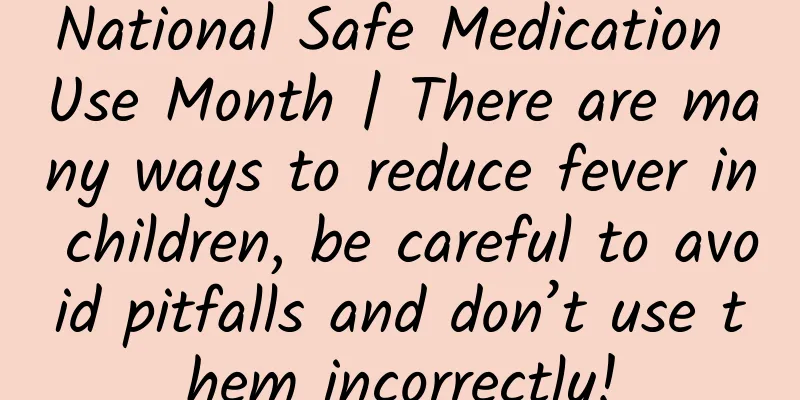National Safe Medication Use Month | There are many ways to reduce fever in children, be careful to avoid pitfalls and don’t use them incorrectly!

|
Winter is coming, and children's resistance is weak. Colds and fevers bother many parents. Have you ever seen such a scene around you: The child suddenly had a fever, but the family had run out of antipyretic medicine for the child. The mother said, "Give the child half an adult antipyretic pill and let him take it first." The medicine was too bitter, and the child refused to take it. The father said, "It's okay, mix it with milk or juice and drink it." The child's fever didn't get better, and the grandfather said, "Here are other cold medicines, take them together and you will get better faster." After taking it for a week, it still didn't get better, which was really worrying. The grandmother said, "The disease comes like a mountain falling, and the disease goes away like a thread. Time is too short, continue to take the medicine for a few more days." Are you familiar with the above practices? Yaowa tells you that, in fact, these practices are all pitfalls! So, how can we avoid them? Pit 1 Take antipyretics as soon as you have a fever. Everyone's normal body temperature fluctuates throughout the day, and the fluctuation range varies from person to person. There is no fixed value. Clinically, a rectal temperature ≥ 38℃ or an axillary temperature ≥ 37.5℃ is usually defined as a fever. But it does not mean that antipyretics should be used if the temperature is higher than this! Generally, 37.5℃~38℃ is defined as low fever, 38.1℃~39℃ is defined as moderate fever, 39.1℃~41℃ is defined as high fever, and >41℃ is defined as hyperpyrexia. Currently, according to the recommendation of the World Health Organization (WHO), it is necessary to use antipyretics only when the body temperature is higher than 38.5℃. For babies aged 2 to 6 months, if the rectal temperature is ≥39.0℃ (oral temperature 38.5℃, axillary temperature 38.2℃), if there is any discomfort, oral antipyretics can be taken. Pit No. 2 Children use adult antipyretics Children are a special group of people, not smaller versions of adults. Children's organs are not fully developed, many organs and nervous systems are not fully developed, and physiological functions and biochemical metabolism are not yet perfect, so they have higher requirements for safe medication. When children use adult antipyretics, the drugs need to be metabolized by the liver and kidneys, and the liver and kidney functions of children are not fully developed, and their ability to metabolize and excrete drugs is weak, which can cause liver and kidney damage and even adverse reactions. Therefore, children must use children's medicines to reduce fever, and not adult medicines, and they should be used strictly according to the instructions. Pit 3 Long-term use of antipyretics Common antipyretics such as acetaminophen and ibuprofen are non-steroidal anti-inflammatory drugs, which mainly relieve fever, analgesia and inflammation. They are only symptomatic treatments and cannot eliminate the root cause. Long-term use can cause some gastrointestinal reactions, such as nausea, vomiting, abdominal pain, diarrhea, etc., and may also cause rashes, urticaria, itching, etc. When a child's fever exceeds 38.5℃, the above two drugs can be used repeatedly every 6 to 8 hours, but no more than 4 times in 24 hours and no more than 3 days. If you need to use them for an extended period of time, you should seek medical attention in a timely manner and follow the advice of your doctor and pharmacist. It should be noted that for those who are allergic to non-steroidal anti-inflammatory drugs, these two drugs are prohibited. Pit 4 Alternating or combining use of antipyretics. Currently, domestic and international guidelines such as the "Evidence-Based Guidelines for the Diagnosis and Treatment of Unknown Acute Fever in Children Aged 0 to 5 Years in China", the American Academy of Pediatrics' "Fever and Use of Antipyretics in Children", the UK National Institute for Health and Clinical Excellence's "Evaluation and Initial Management of Febrile Illness in Children Under 5 Years", and the Italian Pediatric Society's "Guidelines for the Management of Signs and Symptoms in Children with Fever" do not recommend the alternating or combined use of acetaminophen and ibuprofen for children's fever reduction, otherwise it will lead to confusion in dosing and increased toxicity. What should I do if my baby still has a fever after taking antipyretics 4 times a day? Antipyretics treat the symptoms but not the root cause. If the baby still has a high fever, listlessness, repeated crying or even convulsions after taking the medicine 4 times a day, you should seek medical attention in time to find out the cause and take appropriate treatment measures. Pit No. 5 Feeding antipyretics with milk or juice Milk contains a lot of trace elements such as calcium, iron, and magnesium, which may react with antipyretics, not only affecting gastrointestinal absorption and failing to achieve the antipyretic effect, but may even render the drugs ineffective and cause discomfort. Drinking juice can increase stomach acid, and since antipyretics are irritating to the gastric mucosa and are also acidic, using them together can easily lead to symptoms such as acid reflux, heartburn, and vomiting. Therefore, it is best to take the medicine with warm water. If you need to drink milk or juice, it is best to leave an hour between them. There is a lot of knowledge about medication for children, and scientific medication requires methods. Drugs should be used exclusively and should not be combined or alternating. Medication safety comes first, be careful not to fall into the trap! |
Recommend
Treatment of cervical erosion during childbirth
Cervical erosion has an incubation period. During...
Toothache after exercise, go to the cardiology department! Please keep this "registration according to symptoms" guide
Do you go to the dentistry department for toothac...
Which is better, human or medical abortion?
Women get pregnant unexpectedly because both part...
What is the reason for the severe backache?
In daily life, especially female friends often ha...
Lung nodules ≠ lung cancer, stop scaring yourself!
The report released by the World Health Organizat...
Why can't I move my neck when I wake up?
Review expert: Wang Linyu, deputy chief physician...
There is a painless lump under the breast
Breasts are the most important secondary sexual c...
How to regulate high bile acid in pregnant women
Recently, Ms. Peng from Hangzhou became pregnant....
What does it feel like to have sex with a prolapsed uterus?
Female friends are very troubled by the occurrenc...
Red core wash for cervical erosion
Some patients will experience obvious pain after ...
Will taking hormone pills affect menstruation?
Women may experience some side effects when takin...
Picture of gestational sac falling during pregnancy
The gestational sac is the initial test tube embr...
What is the cause of acne at the vaginal opening?
Female friends must pay attention to relevant car...
How to massage your breasts to make them bigger
Many women hope that their breasts can become big...
What is the cause of female blood in urine and how to solve it
Some women will find blood in their urine when go...









